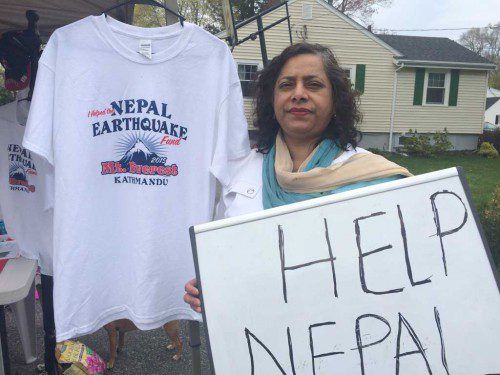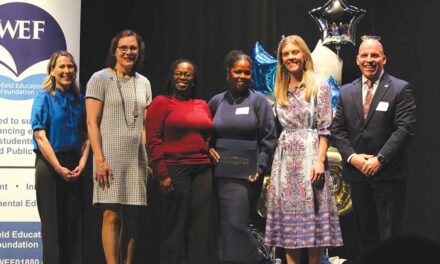
DR. USHA SHARMA, a Greenwood resident, is intently focused on raising funds for the victims of the April 25 earthquake in Nepal. (Courtesy Photo)
By GAIL LOWE
WAKEFIELD — The early morning hours of Saturday, April 25, were no different for Greenwood resident Usha Sharma. After a busy work week, the weekend was here and that meant she could rest in bed a while longer before getting up to start her day.
But her son Baivab, a Wakefield Memorial High School graduate, changed all that when he came to her bedroom door and announced there had been a violent and massive earthquake in the family’s native Nepal.
“I got up right away and tried to call my mother, who still lives in Nepal, but I was so upset I could not remember her number,” said Sharma. She then checked one of her notebooks and finally found the right number. When she placed the call, her brother answered.
“We survived! We survived!” he yelled into the phone. Sharma then spoke to Kumari, her mother, and learned that all of her family members were safe but that the buildings in the town where they live were rattling. Everyone, said Kumari, was afraid of what might be coming next.
As reports continued to flow into newsrooms, Sharma, a professor of chemistry at several Greater Boston colleges, felt helpless but knew she had to do something to help.
Since her work required that she be here, Sharma dug deep into her own finances and started a “Help Nepal” fund with $1,100 of her own family’s money and started selling “Help Nepal” T-shirts for $10 each. Within days, she had sold 80 T-shirts in the driveway of her home, and soon the $1,100 grew to $1,200. Sharma is continuing to raise funds and is reaching out to the public for help.
Donations by check made payable to Nepal Earthquake 2015 can be sent to 61 Harrison Ave., Wakefield MA 01880, Sharma’s home address. Santander Bank on Main Street has set up a special account where donations are being deposited.
By now, most people know that the quake measured 7.8 on the Richter scale and killed more than 8,000 people and injured nearly 18,000 others. Another 366 are reportedly still missing. And just yesterday, another quake measuring 7.3 killed an additional 32 people, according to news reports.
In the aftermath, people scrambled to search for their loved ones in remote villages, only to be faced by the extreme conditions of hills and poor road access, some only accessible by walking or trekking for several days. Conditions are poor, also, due to the poverty of the people and limited capacity of the government.
Kathmandu sustained damage as old buildings were not built with reinforced columns. Everywhere, electric wires are hanging while access to clean water is scarce. Food supplies, too are becoming scarce, and people have been forced to leave. Tourism, the country’s main source of revenue, has been impacted as historic buildings went down and snow avalanches killed mountain climbers in the Himalayas.
Since the April 25 quake, Sharma has learned that a close friend in New York lost 14 family members.
“It takes a lot of time to rebuild a neighborhood, a town, a country — it can be 20, 30 or 50 years or longer to rebuild,” she said.
Immediate needs for the people of Nepal are housing, food and water. “Water is a problem all the time,” she continued.
Sharma is not the only person in Wakefield concerned about the people of Nepal. Local Attorney Patrick Curley is, too.
“I had the good fortune to spend approximately five months in Nepal during a series of visits n 2000, 2001 and 2005,” said Curley. “Nepal and its dynamic people have a tendency to hold a very special place in the hearts of foreign visitors like me.”
When Curley first heard about the April 25 earthquake, he immediately thought of his Nepali and Tibetan friends in Kathmandu and in the mountains.
“My fears grew as I witnessed the devastating destruction broadcast over the Internet,” he said. “It was a great relief that my friends in Kathmandu and Pokhara responded to me via e-mail that they were safe and focused on helping others.”
As good as this news is, however, Curley has yet to hear from those at the remote school where he taught math for three months in the spring of 2001. Located at roughly 12,000 feet in the Himalayas and a hike of several days from the nearest road, the Lophel Ling School serves the families of Tibetan refugees who have settled in that region over the last few decades.
“It is set in a high valley surrounded by peaks rising to 25,000 feet and beyond — a true Shangri-La,” said Curley.
Unfortunately, the river stones and mortar used to build the school were not engineered to withstand a massive earthquake, said Curley. His hope is that the students, teachers and staff are all safe.
“From what I can find on the Internet, initial reports from the Manang region where the school is located suggests that the area did not experience the devastation affecting other parts of Nepal,” he said.
“I worry because the world’s attention has largely passed on to the next big story of the week,” said Curley.
Yet the suffering of the people of Nepal has only begun, Curley added. Even before the quake, Nepal was one of the poorest countries on earth. A great portion of its youngest and most capable citizens — people like Sharma — have left Nepal for opportunities abroad so they can help support their families back home. This further compounds the current tragedy and struggle in Nepal because the skills and energy of many young and capable people are now desperately needed back home.
“The need for help in Nepal is extraordinary,” said Curley. “My friends on the ground in Nepal report that timing is critical because the summer monsoons will begin at the end of May. Shelter, water, food and sanitation require urgent attention before the relentless rains arrive and spread further disease and suffering.”
For more information about Usha Sharma’s fundraiser, e-mail her at drsharma2010@aol.com.




